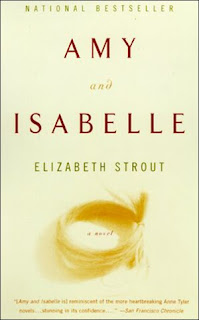 Amy and Isabelle, by Elizabeth Strout (author of Olive Kitteridge) is maybe the third book I've actually completed for my book club (on time) in as many years. I guess it helped that I already fell madly in love with Elizabeth Strout's writing.
Amy and Isabelle, by Elizabeth Strout (author of Olive Kitteridge) is maybe the third book I've actually completed for my book club (on time) in as many years. I guess it helped that I already fell madly in love with Elizabeth Strout's writing.We find out early on that Isabelle's daughter Amy has committed some shameful act, probably with her math teacher, Mr. Robertson. (There's going to be a little spoilage going on here, so if you don't want to know, stop reading now.) What I loved most about this book is how believable the characters and events are. As a teacher (and a onetime teenager), I find it hard to imagine how a relationship between teacher and student can go so far down the wrong road. Yet, as we get to know Amy throughout the story, I see exactly why she chose to begin a relationship with Mr. Robertson. Most telling, perhaps, is the fact that she continues to address--and think about--him as Mr. Robertson, no matter how far their relationship progresses.
It disturbed me immensely throughout the book how much blame Isabelle placed on her daughter Amy for the perceived shame caused by the discovery of Amy and Mr. Robertson. Clearly, Amy is the victim here. Why would Isabelle direct so much anger toward her, instead of at the older authority figure who took advantage of a shy girl with little self-esteem. Somehow, though, by the end, it all makes sense. This story isn't told laterally; instead Strout shifts easily and seamlessly between the past and present in order to give the reader the clearest sense of how one affects the other.
I am madly, madly in love with Elizabeth Strout.
No comments:
Post a Comment